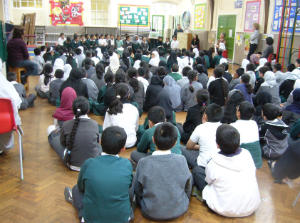Collective responsibility for school assemblies
There have long been calls to reform the law on collective worship, but as long as it remains churches can help schools seeking to comply with it, writes Martin Sweet of the Baptist Education Group
 “I can assure you that the Government’s policy on collective worship (school assemblies) has not changed. The law remains that all schools must hold a daily act of collective worship. We have not asked schools or anyone else to stop using it.”
“I can assure you that the Government’s policy on collective worship (school assemblies) has not changed. The law remains that all schools must hold a daily act of collective worship. We have not asked schools or anyone else to stop using it.”
So wrote the then Secretary of State for Education Michael Gove in February 2013.
Indeed, in April the Department for Education wrote (13 April 2014) that: "The Government believes that the requirement for collective worship... encourages pupils to reflect on the concept of belief and the role it plays in the traditions and values of this country. We have no plans to change the current requirements for the daily act of collective worship."
The Government's defending of collective worship highlights that opponents are continuing to attack it. It's a debate that has been rumbling for many years.
As far back as 2003, the then secretary of state for education Charles Clark, promised that he would "pick up on this", presumably aware of the pressure that some were lobbying for a change in the law.
As recently as June this year, Emma Knights, the Chief Executive of the National Governors Association suggested that "it is not reasonable to expect schools which do not have a religious character to conduct a daily act of collective worship. Most do not have the .. staff to lead a daily act of worship."
The National Secular Society produced a report only a year ago in which it claimed that state schools are being targeted and exploited by evangelical groups, though in response the DfE suggested there was no evidence to support these claims and had not received any complaints about this.
The official guidance produced in 1994 actually attempted to clarify what made an act of worship Christian: namely, that it should accord special status to Jesus Christ. In an age sliding towards secularisation, no wonder so many objected, and still object.
On the other hand, there remains support: in October 2012, a joint statement published by AREIAC (Association of Religious Education Inspectors, Advisors and Consultant) and the National Association of Standing Advisory Councils on Religious Education (NASACRE), made it clear that collective worship "can and should be an inclusive experience which, when done well, can make a valuable and highly positive contribution to the life in general in all schools."
But who will decide what happens? Or more astutely, whether change or not, who will the government listen to? In an article for SACRE News (produced by NASACRE, summer 2012) Julie Grove suggested that in a "culture of secularisation, against the force of vociferous anti-religious rhetoric, collective worship is in danger of sliding into oblivion". Julie rightly suggests that the way forward is to "understand the nature and purpose of collective worship better".
 One thing is definite: the debate is likely to continue until change is forced by someone somewhere.
One thing is definite: the debate is likely to continue until change is forced by someone somewhere.
Is this something the church can help with? Yes! Is this an opportunity for evangelism? Clearly not! It is an opportunity for the church to get alongside school staff and governors seeking to comply with the law as it stands.
The big question is whether the church still believes it has a voice, one not stuck behind debilitating political correctness, nor too timid to state its own preference. Perhaps the National Secular Society is right to be concerned if the church merely sees ‘collective worship’ as an evangelical opportunity. In fact, if that is all the church sees it as, we shall add more weight to the NSS argument and possibly promote change far quicker.
But If we take on board the responsibility to get alongside schools, do that well, maybe the law need not be changed. However, if we do it badly, for the wrong reasons, or not at all, change of some sort is inevitable.
Martin Sweet writes on behalf of the Baptist Education Group (BEG). The vision of the Baptist Education Group is to encourage every Baptist church to strategically engage in supporting its local school.
Martin is director of Spinnaker Trust, an organisation with over 25 years’ experience, based in SE London, regularly supporting over 100 primary schools in London and the Southeast with RE, assemblies and much more.
Baptist Times, 10/11/2014